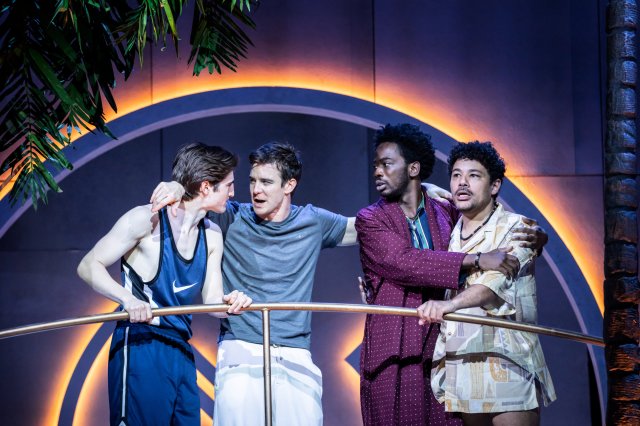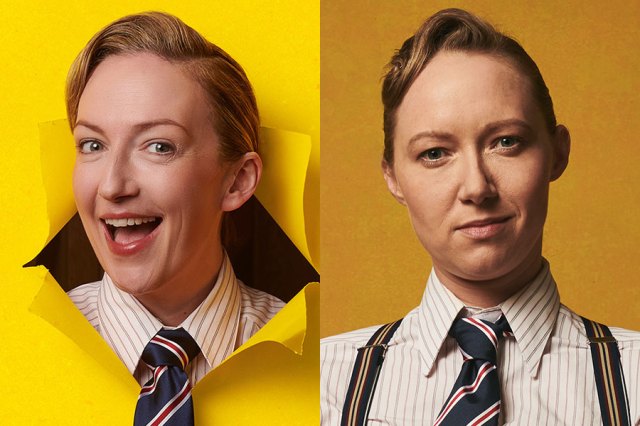Love’s Labour’s Lost review – a brilliant start to a new era at the RSC
Emily Burns directs a bold, cohesive version of one of Shakespeare’s less frequently performed plays

A red carpet and a selfie booth give a celebratory air to the start of the Royal Shakespeare Theatre’s first season under the new management of Daniel Evans and Tamara Harvey. But the real cause for utter, air-punching celebration is the production on stage.
Fresh from her triumph with the revival of Dear Octopus at the National Theatre, director Emily Burns brings the same sincerity, directness and careful attention to detail to one of Shakespeare’s earliest comedies.
With a young and lively cast led by Bridgerton’s Luke Thompson as the charmer Berowne and an acute sense of physical comedy, it combines a lightness of touch with a piercing understanding of the sadness and discomfort that shoots through this story of four arrogant young men who shut themselves away from the world to study and improve their minds yet find themselves undone by four smart women who pierce their hearts and their understanding.
Burns has chosen to bring the story up to date by making the four friends tech bro billionaires, who retreat to a luxury Pacific island in order to fulfil their promise at the urging of Abiola Owokoniran’s relaxed Ferdinand. There’s a strong White Lotus vibe to Joanna Scotcher’s clever set, which turns the paradise of Navarre into a luxury spa, dominated by two palm trees and a revolving staircase.
The same feeling of unthinking entitlement is there in the conception of the supporting characters, most notably Marienella Phillips’ vivid Jaquenetta, who become the spa’s all-seeing support staff, propping up a narcissistic lifestyle with knowing tolerance.
Each detail is beautifully observed. The men rock up preening and posing with iPhones which they ostentatiously lock away, before putting on flower garlands. When the women arrive, led by Melanie-Joyce Bermudez’s fiercely dignified Princess, they are like a sophisticated hen party, Scotcher’s costumes smartly defining their individual style and wealth.
Though the text is trimmed and contextualised, with modern interpolations creating the relaxed, fast-talking vibe, (“I buggered that right up,” announces Nathan Foad’s deliciously daft loafer Costard when he muddles the delivery of love letters) the real pleasure comes from the way the production mines Shakespeare’s language to discover new resonance and humour. When Sarita Gabony’s Maria describes seeing her suitor Longaville (Eric Stroud) at a wedding party in Normandy, she loads the word with a sophisticated contempt; the pedantic Holofernes (Tony Gardner) becomes genuinely funny because every pompous correction he makes is given weight and meaning.
The comedy is up-to-date, with golf buggies, goodie bags, laddish banter, girlie “mmms” and a delirious moment when the men appear as a boyband of medieval knights singing “I Want It That Way” – but also timeless. The physical comedy of the scene when the men discover they have all been sending illicit love sonnets to the women, which puts Berowne up a tree and his friends hiding around him (with Brandon Bassir’s laidback Dumaine almost falling down the stairs in his attempts to stay cool), is deliriously managed. The choreography of each scene is imaginative and fast, the movement (by Shelley Maxwell) giving impetus to the action.
Yet the production never becomes too frenetic. It opens with a speech in Hawaiian, with the Princess gravely undertaking a mission of state for her dying father and it ends with a magical moment when Shakespeare’s song of winter is transformed into an acknowledgement of her responsibilities. When Berowne talks seriously of love and its transformative qualities, his mates gather around him in appreciative silence.
It’s wonderfully calibrated, landing each moment with thoughtful precision. Within this frame, all the performances gleam. Thompson is a deliciously self-aware Berowne, shrugging and self-mocking, stripping to his underwear in an over-the-top effort to show his integrity. His wattage is matched by Ioanna Kimbook’s delicate Rosaline, holding real feeling behind her wit, always slightly more serious than her joshing girlfriends (Amy Griffiths and Sarita Gabony).
Jordan Metcalfe turns their companion Boyet into a sharp-tongued bureaucrat who is just desperate to burst out of his suit, while Jack Bardoe has magnificent fun as the ridiculous Don Armado, flexing his muscles and waving a tennis racquet as he seeks to convince the world of his prowess.
As new beginnings go, this one feels fresh and full of promise, a production that honours Shakespeare’s spirit yet makes him speak to the internet age.
















